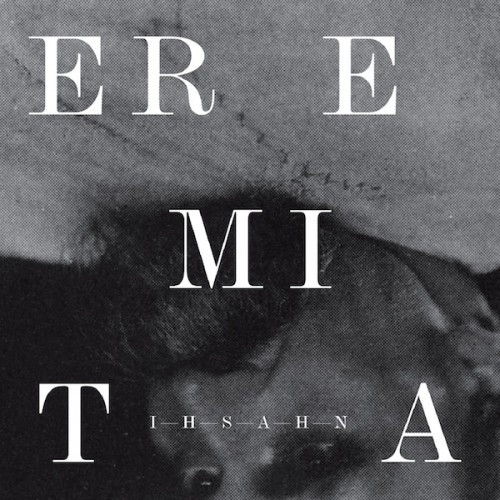
(Andy Synn follows his review of the new Gojira yesterday with this assessment of Ihashn’s new work.)
Perspective, obviously, in writing/reviewing can be a very helpful thing. Where sometimes you do feel the urge to be “first to market” with your ideas and opinions, other times you may benefit from a wider, more considered view.
Case in point: I’m writing a review for the new Ihsahn, having read several other accounts and also having discussed the album with a variety of friends and well-wishers. Though I had already formed my own opinions on the album, I had an urge to get out there and see what others thought, wanting to know if their agreement/disagreement with my opinion had the potential to give me any sort of enlightenment about the record in a greater context than just my own listening.
What I found was interesting – almost to a man, the trend was that those who felt After was a masterpiece were underwhelmed by this album, and those who fell in love with this album were, by and large, those who were unable to connect with After. So either way, this is going to be a divisive album.

Whereas, to me at least, After felt like the culmination of one unifying vision, Eremita comes across as a much more disjointed collection of songs, progressing in an occasionally uneven fashion toward its ultimate goal. It’s a far more linear experience, for better or worse.
There IS a unifying concept underpinning some of the tracks, but it’s not as strong or as defining as on After. In a sense, the album progresses chapter by chapter, with the central concept of the record changing and adapting as the story unfolds. Whereas, by contrast, After was united by core themes that permeated the record as a whole.
Metaphorically, After told its story in images, to be absorbed and contemplated over time, whereas Eremita tells its story in words, requiring both a starting point and an end, and dictating its own, at times inconsistent, flow and direction.
Eremita is also a remarkably bipolar album, containing some of Ihsahn’s most blackened and aggressive solo output, as well as his most melodic and catchy. This actually plays into the album’s strengths, both extremes pushing things out beyond the boundaries of what might have been expected or established, though this is also at times the album’s greatest weakness, the stretching of the tracks to encompass so much sometimes leaving them without a strong centre to hold onto.
Oddly, the two most prominent guest appearances serve to highlight the disparate nature of the album’s composition. Both “Arrival” (featuring Einar Solberg of Leprous) and “Introspection” (featuring the irrepressible Devin Townsend) struggle to establish themselves as Ihsahn tracks, coming across as collaborative ventures with a less focussed sense of identity. I’m not saying that we should expect Ihsahn to stick to his established sound (which is always growing after all), but that these songs could almost be identified as “Featuring Ihsahn”, rather than the other way around. His stylistic “voice” as it were, is somewhat suppressed.
That’s not to say both tracks don’t have their moments, with “Arrival”’s tumultuous Nevermore-esque main riff and scintillating lead work being notable highlights, while the subtle melodic layering of “Introspection” demonstrates that it could almost have been written directly by/for Devin, such is its sense of meditative grace. Still, it’s odd to find the character of “Ihsahn” so subdued.
 Some of the album’s best moments come when Ihsahn unveils his trademark black wizardry and delivers a fresh and fractured take on the familiar black metal style with which he initially achieved notoriety. Conversely, some of the album’s best moments also come when Ihsahn goes off the map somewhat, diving into stranger waters, albeit always with his own signature flair. In fact the VERY best moments come when he somehow manages to do both things at once!
Some of the album’s best moments come when Ihsahn unveils his trademark black wizardry and delivers a fresh and fractured take on the familiar black metal style with which he initially achieved notoriety. Conversely, some of the album’s best moments also come when Ihsahn goes off the map somewhat, diving into stranger waters, albeit always with his own signature flair. In fact the VERY best moments come when he somehow manages to do both things at once!
As an example of this, “The Paranoid” is both a face-melting black metal number and a tour-de-force of shameless psychedelic-pop moments, mixing angular tremolo guitars, ear-splitting drums, a hypnotically catchy chorus, crunchy, odd-timed ska-style riffage, and a bold-as-brass horn section, into one coherent package. It’s simultaneously one of his most direct and one of his most unusual compositions.
“Catharsis” would feel right at home on After, switching between tormented howl and breathless croon while thrumming 8-string chords and baroque melodies twist and writhe. Jorgen Munkeby’s sax makes a welcome reappearance, having previously been established as an important tool in Ihsahn’s musical arsenal, its minimalist deployment serving to accentuate the track’s draining emotional themes.
Munkeby is arguably used more sparingly this time around, and as such doesn’t provide quite the same impact or connective tissue. Though a little wasted on the lacklustre “The Eagle and The Snake”, he absolutely shines on “The Grave”, one of the album’s best and most distinctive tracks. The former, despite possessing a smoky dive-bar chorus and some spindly, skittering guitar work, never really achieves any sense of purpose, but the latter is a far more successful exploration of doomy dynamics and hellish jazz-metal, eschewing the conventions of normal song-writing. Lyrically and vocally sparse, the track is built around a tormented mantra of “he hammers the earth, with shovel”, while maddening seizures of saxophone and pounding, rusted chords stretch the ominous atmosphere to breaking point.
One of the key things about this record is its maturity, particularly from a lyrical perspective, with a contemplative focus benefiting from moments of calm restraint and cathartic release. “Something Out There” showcases this sentiment with its lyrical message of age and change, while also echoing this maturity in its clever structuring. Much like previous album highlight “The Paranoid”, it successfully incorporates styles from opposite ends of the musical spectrum into one cohesive whole. Elements of Prometheus-era Emperor are consciously and creatively deployed to give the track its backbone, erupting with calculated rage and anguish, while the track’s pseudo-chorus refrain is a beautiful juxtaposition of melodic restraint and blasting force. A clever drumming change foreshadows a shift in direction, the vocals fading out on the repeated line “something, something, something…” as majestic lead guitars rise up to guide the track home.
The keyboard-led instrumental interlude of “Grief” works surprisingly well as an intervening chapter between two of the album’s best songs, the aforementioned “Something Out There” and the stunning mood-piece of “The Grave”. It serves both as a comedown from the energy of the previous track and as preparation for the deep, dark number that follows, allowing the listeners a moment to collect themselves and to reflect. It’s here that the album really establishes itself as telling a linear story, constructed around a central concept that, while occasionally allowed to lapse, does manage to tie the material together more convincingly.
 The Bladerunner synths that introduce “Departure” are an intriguing choice, and a clever one at that, their collected calm providing contrast for the introverted chaos which follows. Though the track may progress slowly through several bars of restrained, melancholy guitars and softly crooned vocals, it eventually fissions into crunchy distorted riffage, throat-scraping vocals, and a stomping, precise drum attack. The riffs ebb and flow, sinuous and supple, building and building to… nothing. The song drops into a sombre interlude of ethereal synths and aching female vocals which drift languidly on a wave of shadowy melancholy, denying the listener the resolution they long for. Yet just as suddenly, the song bursts into a chaotic, disconcerting metallic furore which finally, finally, brings the song to its climax.
The Bladerunner synths that introduce “Departure” are an intriguing choice, and a clever one at that, their collected calm providing contrast for the introverted chaos which follows. Though the track may progress slowly through several bars of restrained, melancholy guitars and softly crooned vocals, it eventually fissions into crunchy distorted riffage, throat-scraping vocals, and a stomping, precise drum attack. The riffs ebb and flow, sinuous and supple, building and building to… nothing. The song drops into a sombre interlude of ethereal synths and aching female vocals which drift languidly on a wave of shadowy melancholy, denying the listener the resolution they long for. Yet just as suddenly, the song bursts into a chaotic, disconcerting metallic furore which finally, finally, brings the song to its climax.
This album is certainly not an unmitigated success, but it does see Ihsahn continuing to try new things and push his musical muse into unfamiliar waters. As a result of this experimentation certain elements work better than others, leaving the album feeling oddly uneven and disjointed. The best tracks, however, either overcome this (“The Paranoid”, “Something Out There”) to create something greater than the sum of their disparate parts, or practically revel in it, turning disjointed fever-dreams into compelling art (“The Grave”, “Departure”).
Thematically it’s clearly a more personal, and yes, more mature, album, with its focus on introverted emotions, passion, catharsis, introspection, paranoia, and grief. This makes it somewhat different from Ihsahn’ previous albums, as a more obvious exploration of self and situation, which (in keeping with the oddly contradictory nature of the album) makes it both a deeper portrait of the man, and one that is harder to penetrate and, indeed, harder to relate to.
Largely though, it seems that your reaction to this record will depend on how you felt about After. If that record did not move you as perhaps you felt it should have, then Eremita could very well be the album for you. But if you feel, as I do, that After was something of a pinnacle for Ihsahn, then perhaps Eremita will serve more as a curious addendum, a collection of songs and ideas that see Ihsahn take a tentative step sideways, rather than a confident step forward.
EDITOR’S NOTE: Eremita was released on June 19 by Candlelight Records. Here are Ihsahn links:
http://www.ihsahn.com
http://www.facebook.com/ihsahnmusic
http://www.youtube.com/artist/ihsahn
And here is “The Paranoid”:
[audio:https://www.nocleansinging.com/wp-content/uploads/2012/06/2.-The-Paranoid.mp3|titles=Ihsahn – The Paranoid]

I am exactly in the second case of your conclusion.
Nice album but not as good as After.
I think the bigger difference to me was a big focus on verse-chorus-verse structure and more concise songs. This definitely feels like his “Pop” album. I really like all the songs you liked as well, and I enjoy that, like ALL of his albums, it gets better as it goes on. I do, however, think “arrive” had a great hook and a great gallop riff.
Oh, and My fav Ihsahn album is Angl
I know quite a few who think Angl is the best, and a couple who still prefer The Adversary, but there was no distinct tendency to prefer After/Eremita, or vice-versa, among those people.
You were right… we both reached a similar conclusion, but in entirely different ways. I personally feel that ‘The Grave’ is the weakest track on the album, meandering too much and not really going anywhere. I believe ‘The Paranoid’ is probably the highlight of the album for me.
See, I told you. That’s why I really enjoyed reading your review. It was like some weird parallel-earth version of me.
The Professor’s review, for comparison, can be found here by the way: http://www.oculusinfernus.com/2012/06/19/analyses-ihsahn-eremita/